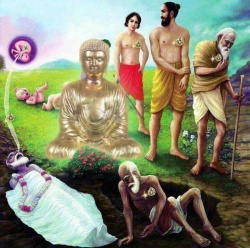Sīsupacālāsuttaṁ: The Discourse about Sīsupacālā
Sīsupacālāsuttaṁ
The Discourse about Sīsupacālā
169. Evaṁ me sutaṁ:
Thus I have heard:
ekaṁ samayaṁ Bhagavā Sāvatthiyaṁ viharati
at one time the Gracious One was dwelling near Sāvatthī
Jetavane Anāthapiṇḍikassa ārāme.
at Anāthapiṇḍika's grounds in Jeta's Wood.
Atha kho Sīsupacālā bhikkhunī, pubbaṇhasamayaṁ nivāsetvā,
Then the nun Sīsupacālā, having dressed in the morning time,
pattacīvaram-ādāya, Sāvatthiṁ piṇḍāya pāvisi.
after picking up her bowl and robe, was entering Sāvatthī for alms.
Sāvatthiyaṁ piṇḍāya caritvā, pacchābhattaṁ piṇḍapātapaṭikkantā,
After walking for alms in Sāvatthī, and returning from the alms-round after the meal,
yena Andhavanaṁ tenupasaṅkami divāvihārāya,
she approached the Blind Man's Wood to pass the day,
Andhavanaṁ ajjhogahetvā,
and having entered Blind Man's Wood,
aññatarasmiṁ rukkhamūle divāvihāraṁ nisīdi.
she sat down at the root of a certain tree to pass the day.
Atha kho Māro Pāpimā yena Sīsupacālā bhikkhunī tenupasaṅkami,
Then the Wicked Māra approached the nun Sīsupacālā,
upasaṅkamitvā Sīsupacālaṁ bhikkhuniṁ etad-avoca:
and after approaching he said this to the nun Sīsupacālā:
“Kassa nu tvaṁ, bhikkhuni, pāsaṇḍaṁ rocesī?” ti
“Which heresy, nun, are you pleased with?”
“Na khvāhaṁ, āvuso, kassaci pāsaṇḍaṁ rocemī.” ti
“I am not pleased, friend, with any heresy.”
“Kiṁ nu uddissa muṇḍāsi, samaṇī viya dissasi,
“On whose account was your head shaved, as you look like an ascetic, [1]
Na ca rocesi pāsaṇḍaṁ, kim-iva carasi momuhā?” ti
You don't rejoice in heresy, why (then) do you live like a fool?” [2]
“Ito bahiddhā pāsaṇḍā diṭṭhīsu pasīdanti te,
“Outside of this [3] there are heretics [4] who are stuck fast [5] in their views,
Na tesaṁ Dhammaṁ rocemi, na te Dhammassa kovidā.
In their Dhamma I am not pleased, their Dhamma is lacking in skill.
Atthi Sakyakule jāto Buddho appaṭipuggalo,
An unmatched Awakened One is born in the Sakya family, [6]
Sabbābhibhū Māranudo, sabbattham-aparājito.
Lord of all, [7] dispelling Māra, [8] undefeated in every place. [9]
Sabbattha mutto asito, sabbaṁ passati Cakkhumā,
Free from all things, [10] independent, [11] the Visionary who sees all,
Sabbakammakkhayaṁ patto, vimutto upadhisaṅkhaye,
Attained to the end of all deeds, [12] free in the ending of clinging, [13]
So mayhaṁ Bhagavā satthā, tassa rocemi Sāsanan.”-ti
The Gracious One is my teacher, in his Teaching I am well-pleased.”
Atha kho Māro Pāpimā: “Jānāti maṁ Sīsupacālā bhikkhunī!” ti
Then the Wicked Māra (thought): “The nun Sīsupacālā knows me!”
dukkhī dummano tatthevantaradhāyī ti.
and pained and depressed he vanished right there.
Footnotes
- ↑ Comm: samaṇī viya dissasī ti samaṇisadisā dissasi; as you look like an ascetic means you look the same as an ascetic.
- ↑ Comm: kim-iva carasi momūhā ti kiṁ kāraṇā momūhā viya carasi? why (then) do you live like a fool? means why, for what reason, do you live like a fool?
- ↑ Comm: ito bahiddhā ti imamhā Sāsanā bahi; outside of this means outside of this Teaching.
- ↑ Comm: pāsaṁ ḍentī ti pāsaṇḍā, sattānaṁ cittesu diṭṭhipāsaṁ khipantī ti attho. Sāsanaṁ pana pāse moceti tasmā pāsaṇḍo ti na vuccati, ito bahiddhā yeva pāsaṇḍā honti; caught in a snare they are heretics, the meaning is these beings have fallen into a snare of views in their minds. But the (Buddha's) Teaching is free from snares therefore it is not called a heresy, outside of this there are surely heretics. This is a play on words deriving pāsaṇḍa (heresy) from pāsa (snare), which hardly works in translation.
- ↑ Comm: pasīdantī ti saṁsīdanti lagganti; stuck fast means sinking down, getting attached.
- ↑ Comm: idāni “kaṁ nu uddissa muṇḍāsī?” ti pañhaṁ kathentī atthi Sakyakule jāto ti ādim-āha; now speaking in answer to “on whose account was your head shaved?” born in the Sakya family and so on was said.
- ↑ Comm: tattha sabbābhibhū ti sabbāni khandhāyatanadhātubhavayonigati-ādīni abhibhavitvā ṭhito; herein Lord of all means he stands having overcome all destinations, realms or states involving the constituents, the sense spheres or the elements.
- ↑ Comm: Maraṇamārādayo nudi nīharī ti Māranudo; expelling, driving away Māra as death and so on he is dispelling Māra.
- ↑ Comm: sabbatthamaparājito ti sabbesu rāgādīsu vā Mārayuddhe vā ajito; undefeated in every place means he is undefeated in the war with Māra or (undefeated) by all the passions and so on.
- ↑ Comm: sabbattha mutto ti sabbesu khandhādīsu mutto; free from all things means free from all constituents and so on.
- ↑ Comm: asito ti taṇhādiṭṭhinissayena anissito; independent means independent of the dependence on craving and views.
- ↑ Comm: sabbakammakkhayaṁ patto ti sabbakammakkhayasaṅkhātaṁ Arahattaṁ patto; attained to the end of all deeds means attained to Worthiness with the complete destruction of all deeds.
- ↑ Comm: upadhisaṅkhaye ti upadhisaṅkhayasaṅkhāte Nibbāne ārammaṇato vimutto; in the ending of clinging means free from sense objects by the complete destruction of clinging in Emancipation.





